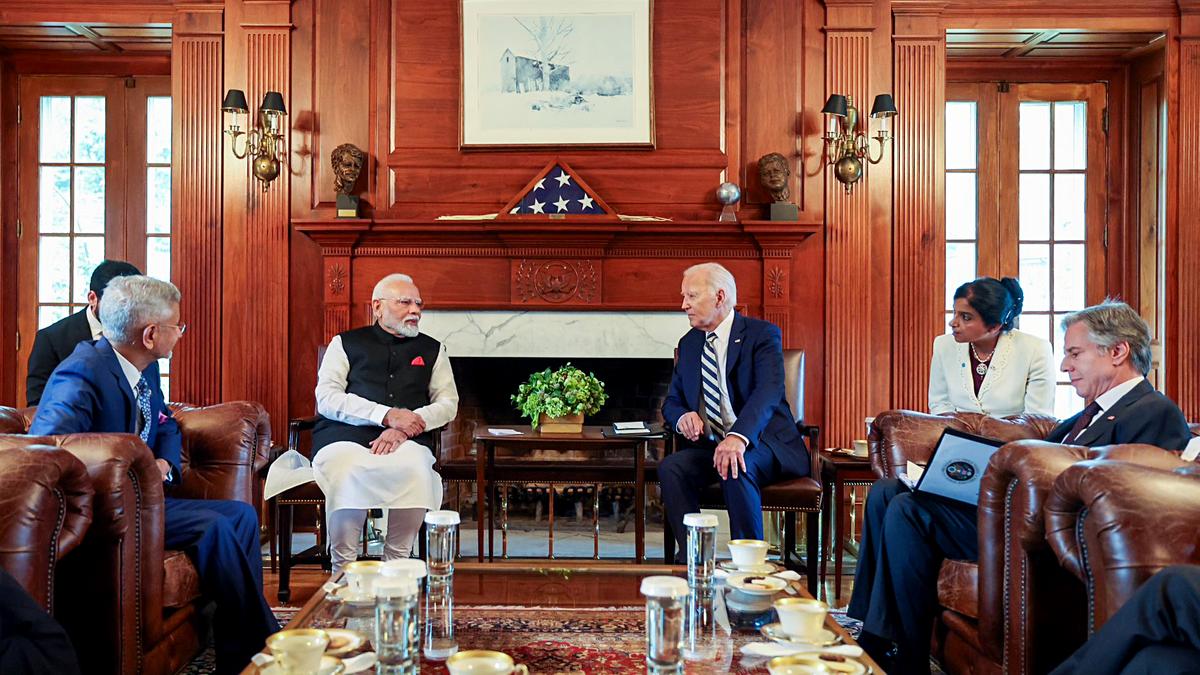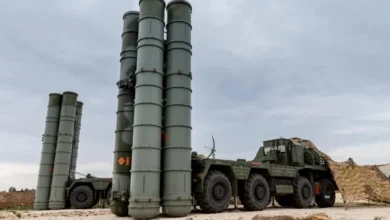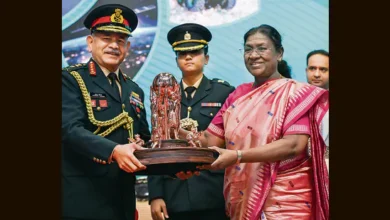U.S. President Biden Welcomes Progress Towards India’s Procurement Of 31 MQ-9B Drones From US

- Modi and Biden commended the efforts to advance cooperation in advanced domains, such as space and cyber, by delving into futuristic collaborations.
- The fact-sheet stated that they expressed their satisfaction with the Memorandum of Understanding signed at the Silicon Valley Summit
US President Joe Biden expressed his satisfaction with the progress made in the procurement of 31 long-endurance MQ-9B armed drones from American defence major General Atomics by India. He and Prime Minister Narendra Modi also pledged to increase the two-way reciprocal supply of defence hardware in response to their shared apprehensions regarding China’s expanding military capabilities.
On Saturday afternoon, the United States President entertained Modi at his residence in Wilmington, Delaware. The two leaders engaged in a comprehensive discussion that encompassed a variety of critical aspects of India-US relations, such as the potential for increased bilateral defence and military cooperation.
According to a joint fact-sheet on the Modi-Biden talks, the two leaders acknowledged the remarkable progress that has been made under the US-India defence industrial cooperation roadmap. This includes the ongoing collaboration to advance priority co-production arrangements for jet engines, munitions, and ground mobility systems.
“President Biden expressed his satisfaction with the advancements made in the procurement of 31 General Atomics MQ-9B remotely piloted aircraft and their accompanying equipment by India. These aircraft will contribute to the intelligence, surveillance, and reconnaissance capabilities of the Indian military in all domains,” the statement stated.
The primary objective of India’s acquisition of the ‘hunter-killer’ drones (16 Sky Guardian and 15 Sea Guardian) from US defence major General Atomics is to enhance its surveillance capabilities in the Indian Ocean region and along the frontier with China, at a cost exceeding USD 3 billion.
It has been discovered that the price negotiations for the procurement have been finalised, and it is anticipated that the agreement will be formally finalised by the end of the month.
The remotely piloted drones are capable of remaining airborne for approximately 35 hours and can be deployed for a variety of missions.
Nevertheless, there was no explicit reference to the ambitious initiative to co-produce F-414 fighter jet engines in India.
GE Aerospace and Hindustan Aeronautics Limited (HAL) agreed to collaborate on the engine production in June of last year.
Modi and Biden expressed their approval of the collaboration between Liquid Robotics and Sagar Defence Engineering in the development and production of unmanned surface vehicle systems. This initiative is expected to enhance maritime and undersea domain awareness.
According to the fact-sheet, the two leaders also applauded the recent conclusion of the Security of Supply Arrangement (SOSA), which has improved the mutual supply of defence goods and services.
“Both leaders are committed to advancing ongoing discussions on aligning their respective defence procurement systems to further facilitate the reciprocal supply of defence goods and services,” the statement stated.
President Biden also expressed his approval of India’s decision to implement a uniform Goods and Services Tax (GST) of five percent on the maintenance, repair, and overhaul (MRO) sector, which encompasses all aircraft and aircraft engine parts.
The appreciation was a result of the simplified tax regime, which will facilitate the establishment of a robust ecosystem for MRO services in India.
The industry was also encouraged by the leaders to promote collaboration and innovation in order to assist India in its pursuit of becoming a premier aviation hub.
Modi and Biden also commended the US industry’s commitment to enhancing India’s MRO capabilities, which include the repair of aircraft and unmanned aerial vehicles.
The recent teaming agreement between Lockheed Martin and Tata Advanced Systems Ltd on the C-130J Super Hercules aircraft programme was also praised by the two leaders.
Lockheed Martin and Tata Advanced Systems Ltd announced a “teaming agreement” on September 10 to expand engagement through the C-130J Super Hercules tactical airlifter project, with an eye towards India’s requirement for military transport planes.
The announcement was perceived as a substantial advancement in the development of India’s aerospace and defence capabilities.
According to the joint document, this agreement will establish a new Maintenance, Repair and Overhaul (MRO) facility in India to support the readiness of the Indian fleet and global partners who operate the C-130 Super Hercules aircraft, building on longstanding industry cooperation.
“This represents a substantial advancement in the defence and aerospace collaboration between the United States and India, and it is indicative of the two nations’ expanding strategic and technological partnerships,” it stated.
Modi and Biden commended the efforts to advance cooperation in advanced domains, such as space and cyber, by delving into futuristic collaborations.
Threat information sharing, cybersecurity training, and collaboration on vulnerability mitigation in energy and telecommunications networks are among the areas in which new cooperation will be established.
The India-US Defence Acceleration Ecosystem (INDUS-X) initiative, which was initiated in 2023, has facilitated a burgeoning defence innovation collaboration between the two governments, businesses, and academic institutions. The prime minister and the president also complimented this development.
“The fact-sheet stated that they expressed their satisfaction with the Memorandum of Understanding signed at the Silicon Valley Summit, which facilitated the increased collaboration between the Indian Ministry of Defence’s Innovations for Defence Excellence (iDEX) and the US Department of Defense’s Defence Innovation Unit (DIU).”







Facebook Comments